
David Robert Jones, known professionally as David Bowie, was an English singer-songwriter and actor. A leading figure in the music industry, he is regarded as one of the most influential musicians of the 20th century. Bowie was acclaimed by critics and musicians, particularly for his innovative work during the 1970s. His career was marked by reinvention and visual presentation, and his music and stagecraft had a significant impact on popular music.
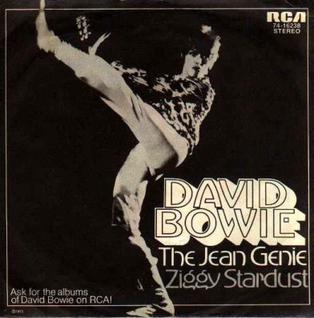
"The Jean Genie" is a song by English singer-songwriter David Bowie, originally released in November 1972 as the lead single to his 1973 album Aladdin Sane. Co-produced by Ken Scott, Bowie recorded it with his backing band the Spiders from Mars − comprising Mick Ronson, Trevor Bolder and Mick Woodmansey. According to Bowie, it was "a smorgasbord of imagined Americana", with a protagonist inspired by Iggy Pop, and the title being an allusion to author Jean Genet. One of Bowie's most famous tracks, it was promoted with a film clip featuring Andy Warhol associate Cyrinda Foxe and peaked at No. 2 on the UK Singles Chart.

"Life on Mars?" is a song by English singer-songwriter David Bowie, first released on his 1971 album Hunky Dory. In 1968, Bowie was commissioned to write English lyrics for the Claude François French song "Comme d'habitude". After his lyrics were rejected, songwriter Paul Anka rewrote it into "My Way", which was made famous by singer Frank Sinatra in 1969. Annoyed at the success of "My Way", Bowie used the song as a template and wrote "Life on Mars?" as a parody of Sinatra's recording. Like other songs Bowie wrote during this period, it was written primarily on piano. Recording for "Life on Mars?" took place on 6 August 1971, the final day of the Hunky Dory sessions. Co-produced by Bowie and Ken Scott, the backing band consisted of guitarist Mick Ronson, bassist Trevor Bolder and drummer Mick Woodmansey; Ronson also composed the song's string arrangement. After failing to acquire pianist Dudley Moore, piano was played by Strawbs member Rick Wakeman.

"Suffragette City" is a song by English singer-songwriter David Bowie. It was originally released in April 1972 as the B-side of the single "Starman" and subsequently appeared on his fifth studio album The Rise and Fall of Ziggy Stardust and the Spiders from Mars (1972). The song was later reissued as a single in 1976, with the US single edit of "Stay" as the B-side, to promote the compilation album Changesonebowie in the UK. Co-produced by Bowie and Ken Scott, it was recorded by Bowie at Trident Studios in London with his backing band the Spiders from Mars, consisting of Mick Ronson, Trevor Bolder and Mick Woodmansey, at a late stage of the album's sessions. The song was originally offered to English band Mott the Hoople, who declined it and recorded Bowie's "All the Young Dudes" instead. It is a glam rock song that is influenced by the music of Little Richard and the Velvet Underground. The lyrics include a reference to Anthony Burgess' novel A Clockwork Orange and the famous lyric "Oooohh Wham Bam, Thank you, Ma'am".
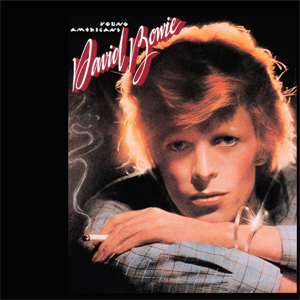
Young Americans is the ninth studio album by English musician David Bowie, released on 7 March 1975 through RCA Records. The album marked a departure from the glam rock style of Bowie's previous albums, showcasing his interest in soul and R&B. Commentators have described the record as blue-eyed soul, although Bowie himself labelled the album's sound "plastic soul". Initial recording sessions took place following the first leg of his Diamond Dogs Tour in August 1974 at Sigma Sound Studios in Philadelphia with producer Tony Visconti and a variety of musicians, including guitarist Carlos Alomar, who would become one of Bowie's most frequent collaborators. Backing vocalists included singer Ava Cherry, Alomar's wife Robin Clark and then-unknown singer Luther Vandross. After the initial sessions, the tour continued, with the setlist and design changed due to the influence of the new material recorded. This portion of the tour has been labeled the Soul tour.
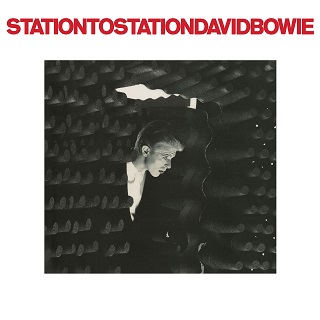
Station to Station is the 10th studio album by English musician David Bowie, released on 23 January 1976 through RCA Records. Regarded as one of his most significant works, the album was the vehicle for Bowie's performance persona, the Thin White Duke. Co-produced by Bowie and Harry Maslin, Station to Station was mainly recorded at Cherokee Studios in Los Angeles, California, in late 1975, after Bowie completed shooting the film The Man Who Fell to Earth; the cover art featured a still from the film. During the sessions, Bowie was dependent on drugs, especially cocaine, and later said that he recalled almost nothing of the production.
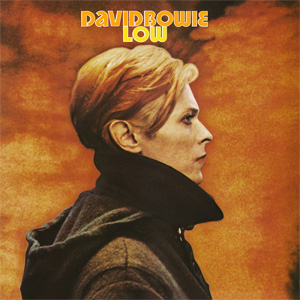
Low is the 11th studio album by English musician David Bowie, released on 14 January 1977 through RCA Records. After years of drug addiction when living in Los Angeles, Bowie moved to France in 1976 with his friend Iggy Pop to sober up. There, Bowie produced and co-wrote Pop's debut studio album, The Idiot, featuring sounds Bowie would explore on his next record. After completing The Idiot, Bowie began recording the first of three collaborations that became known as the Berlin Trilogy with American producer Tony Visconti and English musician Brian Eno. Sessions began at Hérouville's Château d'Hérouville in September 1976 and ended in October at Hansa Studios in West Berlin, where Bowie and Pop had relocated.
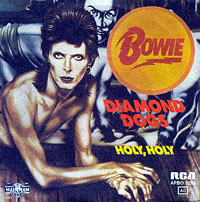
"Diamond Dogs" is a 1974 single by English singer-songwriter David Bowie, the title track of the album of the same name.
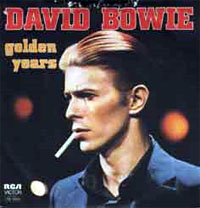
"Golden Years" is a song by English musician David Bowie, released by RCA Records on 21 November 1975 as the lead single from his tenth studio album Station to Station (1976). Partially written before Bowie began shooting for the film The Man Who Fell to Earth (1976), the song was mostly compiled in the studio and was the first track completed for the album. David said the song was written for Elvis Presley, while his wife Angie claimed it was written for her. Recording took place at Cherokee Studios in Los Angeles during September 1975. The song was co-produced by David Bowie and Harry Maslin and features contributions from Carlos Alomar and Earl Slick on guitar, George Murray on bass and Dennis Davis on drums; Bowie's old friend Warren Peace contributed backing vocals and assisted with the vocal arrangements. Due to Bowie's heavy cocaine use, he later recalled remembering almost nothing of Station to Station's production.

"Fame" is a song recorded by English singer-songwriter David Bowie. It was released on his 1975 album Young Americans and was later issued as the album's second single by RCA Records in July 1975. Written by Bowie, Carlos Alomar and John Lennon, it was recorded at Electric Lady Studios in New York City in January 1975. It is a funk rock song that represents Bowie's dissatisfaction with the troubles of fame and stardom.
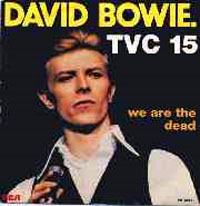
"TVC 15" is a song by English musician David Bowie, released on his 1976 album Station to Station. RCA Records later released it as the second single from the album on 30 April 1976. The song was recorded in late 1975 at Cherokee Studios in Los Angeles. Co-produced by Bowie and Harry Maslin, the recording featured guitarists Carlos Alomar and Earl Slick, bassist George Murray, drummer Dennis Davis, pianist Roy Bittan and Warren Peace on backing vocals. The upbeat song is mostly art rock performed in a style reminiscent of the 1950s. Lyrically, the song concerns a character's girlfriend being eaten by a television set. It was inspired by a dream of Iggy Pop's and Bowie's role in The Man Who Fell to Earth (1976). Some lyrics are also influenced by the Yardbirds and Kraftwerk.

"Scary Monsters " is a song by English singer-songwriter David Bowie, released as the title track of his 1980 album Scary Monsters . It was also issued as the third single from that album in January 1981. Coming as it did in the wake of two earlier singles from Scary Monsters, "Ashes to Ashes" in August 1980 and "Fashion" in October the same year, NME critics Roy Carr and Charles Shaar Murray labelled its release another instance "in the fine old tradition of milking albums for as much as they could possibly be worth". The song was subsequently performed on a number of Bowie tours.
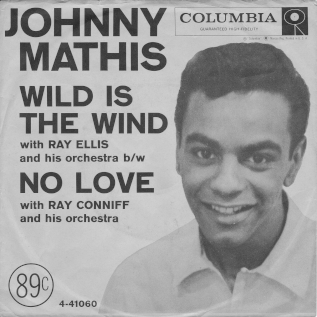
"Wild Is the Wind" is a song written by Dimitri Tiomkin and Ned Washington for the 1957 film Wild Is the Wind. Johnny Mathis recorded the song for the film and released it as a single in November 1957. Mathis' version reached No. 22 on the Billboard chart. It was nominated for an Academy Award for Best Song in 1958, but lost to "All the Way" by Jimmy Van Heusen and Sammy Cahn from The Joker is Wild.
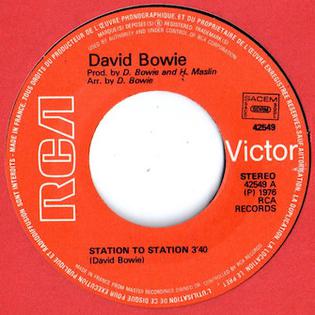
"Station to Station" is a song by English musician David Bowie. It was released in January 1976 as the title track and opener of his tenth studio album Station to Station, as well as on a promotional 7-inch single in France the same month. Co-produced by Bowie and Harry Maslin, it was written and recorded at Cherokee Studios in Los Angeles between September and November 1975. At over 10 minutes in length, it is Bowie's longest studio recording. Opening with a train-like noise, the song's first half is a slow march, built around an atonal guitar riff, while the second half takes the form of a prog-disco suite in a different key and tempo than the first. It has been characterised as art rock and is influenced by the German electronic bands Kraftwerk and Tangerine Dream.
"Word on a Wing" is a song written and recorded by English singer-songwriter David Bowie in 1975 for the Station to Station album, where it appears as the closing track of the LP's first side.

"Stay" is a song by English musician David Bowie, released on his 1976 album Station to Station. The song was recorded in late 1975 at Cherokee Studios in Los Angeles. Co-produced by Bowie and Harry Maslin, the recording featured guitarists Carlos Alomar and Earl Slick, bassist George Murray, drummer Dennis Davis, pianist Roy Bittan and Warren Peace on percussion. The track features prominent dual guitar work from Slick and Alomar, who mostly composed it in the studio. Based on the chord structure of "John, I'm Only Dancing (Again)", a funk reworking of "John, I'm Only Dancing" (1972), "Stay" emulates funk rock, soul and hard rock. Lyrically, the song is about a character who begs his lover to stay, fearing she will leave him for the last time.

Christiane F. – Wir Kinder vom Bahnhof Zoo is a soundtrack album by David Bowie, released on LP in 1981 through RCA Records, for the film about Christiane F. The German title of the film, Wir Kinder vom Bahnhof Zoo, means "We children of Zoo Station", referring to the railway station in Berlin, Germany.
Heroes or Héroes may refer to:

"Lazarus" is a song by English rock musician David Bowie. Released on 17 December 2015 as a digital download, it was the second single from his twenty-sixth and final studio album, Blackstar (2016). It is Bowie's last single to be released during his lifetime. The single received its world premiere on BBC Radio 6 Music's Steve Lamacq on the day of its release as a single. In addition to its release on Blackstar, the track is used in Bowie's off-Broadway musical of the same name. The official music video, directed by Johan Renck, was released on 7 January 2016, three days before Bowie's death.
"Let Me Sleep Beside You" is a song written and recorded by English singer-songwriter David Bowie. It was recorded on 1 September 1967 at Advision Studios in London and marked the beginning of Bowie's working relationship with producer Tony Visconti, which would last for the rest of Bowie's career. A departure from the pop and music hall-influenced material of Bowie's 1967 self-titled debut album and other singles for Deram Records, the song displays a more rock-oriented sound with a cello arrangement from Visconti. The impressionist lyrics also depart from Bowie's prior works, describing love using the act of sleeping together rather than through emotional attachment. The song was rejected by Deram for release as a single, purportedly due to the risqué title. It remained unreleased until 1970's The World of David Bowie compilation.
















